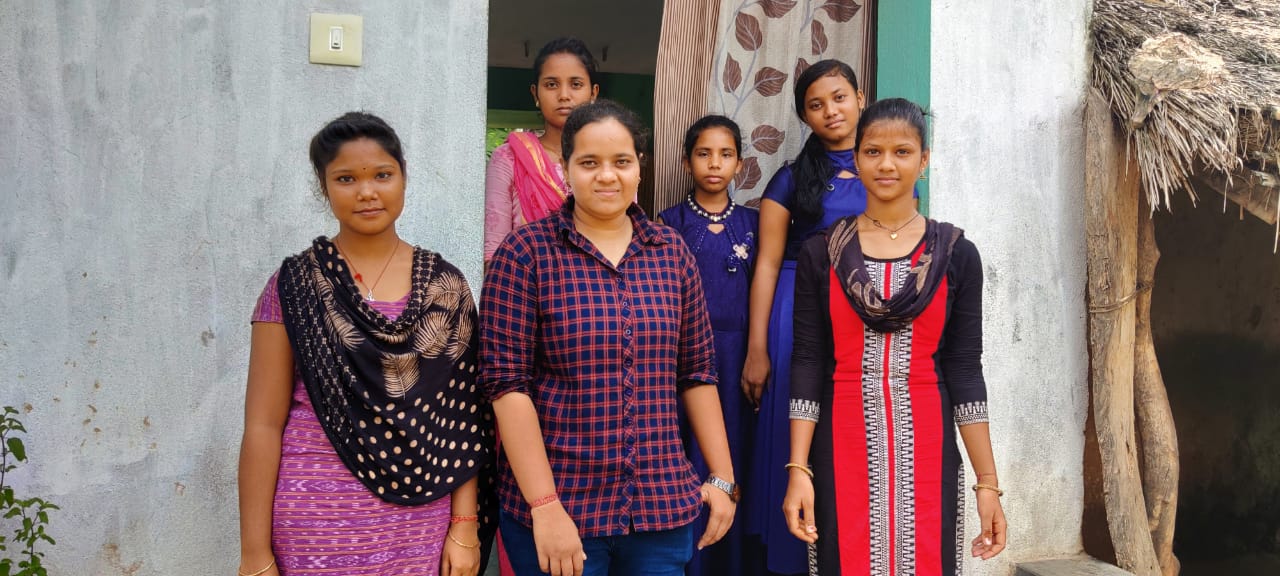Adolescent girls break the taboo to lead conversations on menstrual health in their families
StoryBy Sangita Patra
1 July 2021
Regular sessions on personal hygiene and protective health are educating and enabling rural adolescent girls on management of menstrual hygiene.

In the photo, front row from left Bijayalaxmi Mishra, Pushpanjali Dalbehera, Anuradha Behera.
Photograph by Monalisa Behera
Anuradha Behera, 18, from Udaypur village, Nayagarh, does not feel shy anymore to discuss matters relating to menstruation. She says, “Earlier there used to be so much taboo around menstruation within my own family, I didn’t know whom to approach. But after I attended the session on “Personal hygiene and protective health” organised by Gram Vikas, I felt comfortable asking questions to my mother. It is a natural biological process and I realised that having accurate information and clarity helps. Some of my friends from college tell me that they do not have a proper avenue to discuss issues relating to menstruation and the reproductive tract infections they were having. I remembered what was told in the sensitisation session I had attended and advised them to speak to ASHA didi in case they weren’t comfortable with their mothers.”
Udaypur has two such Adolescent Groups in the village, each having 10 girls in the adolescent age group. Awareness sessions were organised during September-October 2020 with an aim of educating adolescent girls on aspects of physiological and psychological changes happening during adolescence, cognitive development, identity and social development, menstrual health and hygiene management, reproductive tract infections etc. Menstruation still continues to be a taboo in rural areas for which girls face difficulty in acquiring the right information which affects in the management of menstrual hygiene leading to reproductive tract infections. It was emphasised in the training that a healthy diet is as important as proper hygiene management.
Puspanjali Dalbehera, 20, daughter of Sudarsan Dalbehera of Udaypur village recalls “I remember having severe abdominal pain during my menstrual cycles. In the sensitisation session that I attended in our village, they told us about the importance of a balanced diet for adequate development and functioning of body and mind. Right from my childhood I had quite an aversion for vegetables. But now I have started consuming green vegetables and also have started on the iron and vitamin supplements being provided by our Anganwadi didi. It has been six months and I can feel the difference. The intensity of pain has reduced considerably.”
Monthly sessions are being organised to enable girls to manage the adolescent period of storm and stress in a calm way. Sessions on hand washing, personal hygiene, environmental cleanliness, gender equality etc. are also covered during the monthly meetings. Wherever possible, the ASHA and Anganwadi didi are made part of these meetings.
Bijayalaxmi Mishra, 16, daughter of Santosh Kumar Mishra, Padmadeipur, says, “The sessions have been very helpful for me personally. I never could keep track of my cycle for which I wasn’t able to concentrate on my studies. My mother had told me that menstruation occurs once in a month. But in my case it has never been like that. Then in one of the sessions it was told that every girl’s body has its own schedule and menstruation might occur every 21 to 35 days. It is common to have an irregular cycle during the initial years after puberty. Now I am relaxed at least.”
Session on personal hygiene and protective health being conducted for the adolescent girls.
Photograph by Monalisa Behera
ACKNOWLEDGEMENT
Prasanta Kumar Naik and Monalisa Behera helped in story collection. Ganesh Chakravarthi edited the story.
ABOUT THE AUTHOR
Sangita Patra is the Thematic Manager for Documentation and Communications at Gram Vikas.
RELATED BLOGPOSTS
Turning losses into gains: How Mallipanka farmers find success in new crops
Reviving agriculture: Mallipanka’s first strawberry farm story.
Ensuring dignity beyond life: supporting migrant families in their darkest hours
Gram Vikas ensures safe migration and dignified repatriation for deceased migrant workers, supporting bereaved families.
Collective leadership transforms ageing overhead water tank to secure household water supply for all
Kalakhadi’s aging overhead tank revived through collective leadership, ensuring sustainable water supply for the community.